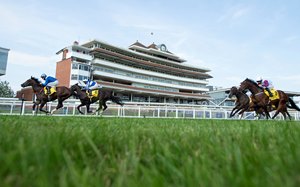Racing to Continue in Britain Despite New Lockdowns


Racing will continue in Britain despite strict new lockdowns announced in England and Scotland Jan. 4 in response to a surge in COVID-19 cases and fears over a highly transmissible new variant of the virus.
Elite sport was given the green light to continue by prime minister Boris Johnson and first minister Nicola Sturgeon as they announced sweeping new measures including the closure of schools and further restrictions on outdoor activities such as group exercise.
However, the beleaguered retail betting sector suffered another setback as all non-essential retail must close under England's new lockdown, meaning the remaining betting shops open in formerly Tier 3 areas must shut.
While the economic blow from the complete closure of betting shops will cost racing in the region of £12.5 million per month, the continuation of live sport—and hence revenue from online bookmakers—is a vital economic lifeline for the industry, which employs roughly 20,000 people, mainly in rural areas.
In an indication of the crippling ongoing cost of restrictions, however, Cheltenham racecourse's management indicated Monday it has all but given up on hosting significant crowds at March's festival, a vital money spinner for the sport and an annual highlight for tens of thousands of racegoers.
Announcing a third national lockdown last night, the prime minister said: "We now have a new variant of the virus and it has been both frustrating and alarming to see the speed with which it is spreading.
"We need to do more, together, to bring this new variant under control."
Earlier Monday, Sturgeon detailed stricter guidelines in Scotland set to remain in force until at least the end of the month.
However, Scottish Racing—representing Ayr, Hamilton Park, Kelso, Musselburgh, which is due to race Jan. 7, and Perth—confirmed the sport would carry on.
It said in a statement: "Following today's announcement, the Scottish government has confirmed that racing can continue behind closed doors. Only those essential to staging fixtures may attend and must continue to follow the protocols already in place. No owners will be permitted to attend a fixture until further notice."
Sturgeon, who said the latest rules would be kept under review and could be extended, added: "I'm sorry to ask for further sacrifices, after nine long months of them. But these sacrifices are necessary.
"And the difference between now and last March is that with the help of vaccines we now have confidence that they will pave the way to brighter days ahead. So—for everyone's sake and safety—please stick with it and stay home."
Cheltenham to Take Place Behind Closed Doors
The four-day Cheltenham Festival, which attracts more than 250,000 spectators, is likely to take place without normal crowds after course boss Ian Renton all but conceded Monday that March's festival—the highlight of jump racing's calendar and a crucial source of revenue for the track's owner, Jockey Club Racecourses—would take place behind closed doors.
"We've accepted that it is going to be a different festival this year to normal," said Renton. "We have to be realistic that it is likely only small numbers of people will be present.
"Let's see where we are by March but the team is focused on setting the stage for four world-class days of racing, which are vital to many livelihoods in the British racing industry and will hopefully be enjoyed by many millions of people on television."

British racing typically records revenue from racegoers in the region of £250 million per year, and with spectators unlikely to return in numbers until at least the spring the COVID-19 bill continues to spiral higher.
Around 1,200 betting shops in England remained open prior to the new lockdown, representing approximately 15% of the total retail estate of 7,630, although they had not been operating normally with limits on how long people spend on site and the absence of live pictures. Nonetheless, they represented another crucial revenue stream for racing now snuffed out.
Hope for the return of racegoers and reopening of non-essential retail now rests on the vaccination program currently being rolled out in Britain, which Monday recorded 58,784 COVID-19 cases and 407 deaths.
Two vaccines have been approved in Britain to fight the virus, the second of which—developed by AstraZeneca/Oxford—was administered for the first time to an 82-year-old man in an Oxford hospital Monday, while Epsom, Leicester, Newcastle, Windsor, and Beverley racecourses are set to be used as vaccination centers.
Johnson said the government aimed to vaccinate everyone in the top four priority levels—including the over 70s, frontline health workers, and the medically vulnerable—by mid-February.
